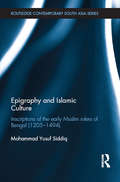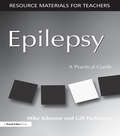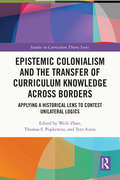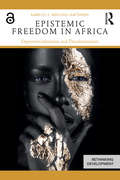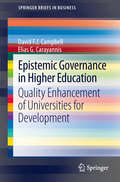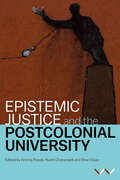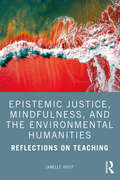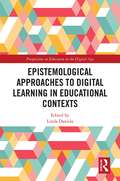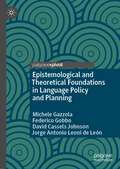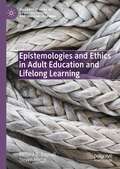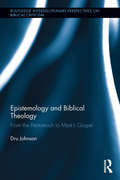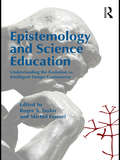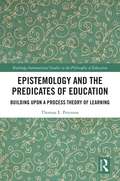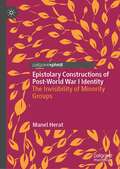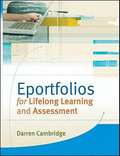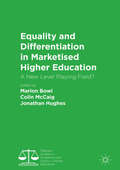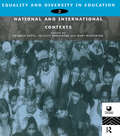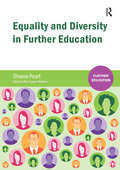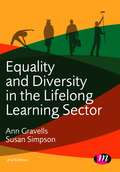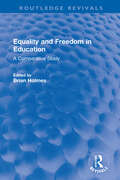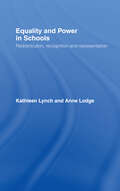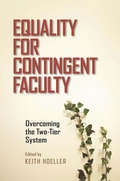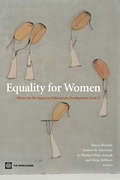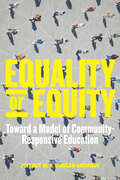- Table View
- List View
Epigraphy and Islamic Culture: Inscriptions of the Early Muslim Rulers of Bengal (1205-1494) (Routledge Contemporary South Asia Series)
by Mohammad Yusuf SiddiqArchitectural inscriptions are a fascinating aspect of Islamic cultural heritage because of their rich and diverse historical contents and artistic merits. These inscriptions help us understand the advent of Islam and its gradual diffusion in Bengal, which eventually resulted in a Muslim majority region, making the Bengali Muslims the second largest linguistic group in the Islamic world. This book is an interpretive study of the Arabic and Persian epigraphic texts of Bengal in the wider context of a rich epigraphic tradition in the Islamic world. While focusing on previously untapped sources, it takes a fresh look into the Islamic inscriptions of Bengal and examines the inner dynamics of the social, intellectual and religious transformations of this eastern region of South Asia. It explores many new inscriptions including Persian epigraphs that appeared immediately after the Muslim conquest of Bengal indicating an early introduction of Persian language in the region through a cultural interaction with Khurasan and Central Asia. In addition to deciphering and editing the epigraphic texts, the information derived from them has been analyzed to construct the political, administrative, social, religious and cultural scenario of the period. The first survey of the Muslim inscriptions in India ever to be attempted on this scale, the book reveals the significance of epigraphy as a source for Islamic history and culture. As such, it will be of interest to students and scholars of Asian Studies, Asian History and Islamic Studies.
Epilepsy: A Practical Guide (Sen Ser.)
by Mike Johnson Gill ParkinsonThis book looks at epilepsy in children. How is it classified, managed and treated? What is the impact on the family and the child involved? How does this affect progress in school and access to the curriculum? There are sections on assessment and diagnosis of epilepsy; epilepsy and behavior; epilepsy and genetics; the implications for schools, the classroom and learning; how access to the curriculum might be increased; social aspects of epilepsy; and language and communication problems associated with epilepsy. Apart from sound content and clear, practical guidance, the reader will also find a glossary of terms, a seizure description chart, a risk assessment chart, a list of useful addresses and an annotated bibliography. This book will be useful to all teachers, SENCOs, Teaching Assistants, Speech and Language Therapists, Educational Psychologists, GPs, parents and carers of children with epilepsy.
Epistemic Colonialism and the Transfer of Curriculum Knowledge across Borders: Applying a Historical Lens to Contest Unilateral Logics (Studies in Curriculum Theory Series)
by Weili ZhaoThis volume uncovers the colonial epistemologies that have long dominated the transfer of curriculum knowledge within and across nation-states and demonstrates how a historical approach to uncovering epistemological colonialism can inform an alternative, relational mode of knowledge transfer and negotiation within curriculum studies research and praxis. World leaders in the field of curriculum studies adopt a historical lens to map the negotiation, transfer, and confrontation of varied forms of cultural knowledge in curriculum studies and schooling. In doing so, they uniquely contextualize contemporary epistemes as historically embedded and politically produced and contest the unilateral logics of reason and thought which continue to dominate modern curriculum studies. Contesting the doxa of comparative reason, the politics of knowledge and identity, the making of twenty-first century educational subjects, and multiculturalism, this volume offers a relational onto-epistemic network as an alternative means to dissect and overcome epistemological colonialism. This text will benefit researchers, academics, and educators with an interest in curriculum studies as well as the study of international and comparative education. Those interested in post-colonial discourses and the philosophy of education will also benefit from the volume.
Epistemic Freedom in Africa: Deprovincialization and Decolonization (Rethinking Development)
by Sabelo J. Ndlovu-GatsheniEpistemic Freedom in Africa is about the struggle for African people to think, theorize, interpret the world and write from where they are located, unencumbered by Eurocentrism. The imperial denial of common humanity to some human beings meant that in turn their knowledges and experiences lost their value, their epistemic virtue. Now, in the twenty-first century, descendants of enslaved, displaced, colonized, and racialized peoples have entered academies across the world, proclaiming loudly that they are human beings, their lives matter and they were born into valid and legitimate knowledge systems that are capable of helping humanity to transcend the current epistemic and systemic crises. Together, they are engaging in diverse struggles for cognitive justice, fighting against the epistemic line which haunts the twenty-first century. The renowned historian and decolonial theorist Sabelo J. Ndlovu-Gatsheni offers a penetrating and well-argued case for centering Africa as a legitimate historical unit of analysis and epistemic site from which to interpret the world, whilst simultaneously making an equally strong argument for globalizing knowledge from Africa so as to attain ecologies of knowledges. This is a dual process of both deprovincializing Africa, and in turn provincializing Europe. The book highlights how the mental universe of Africa was invaded and colonized, the long-standing struggles for 'an African university', and the trajectories of contemporary decolonial movements such as Rhodes Must Fall and Fees Must Fall in South Africa. This landmark work underscores the fact that only once the problem of epistemic freedom has been addressed can Africa achieve political, cultural, economic and other freedoms. This groundbreaking new book is accessible to students and scholars across Education, History, Philosophy, Ethics, African Studies, Development Studies, Politics, International Relations, Sociology, Postcolonial Studies and the emerging field of Decolonial Studies.
Epistemic Governance in Higher Education
by Elias G. Carayannis David F. Campbell"Epistemic governance" refers to the cognitive and knowledge-related paradigms that underlie a social system. In this volume, the authors apply the concept to higher education. In a comprehensive review of recent literature, they define key terms and concepts, arguing that a good, effective and sustainable governance of higher education is not possible unless the epistemic structure and knowledge paradigms of higher education are addressed directly. Effective governance of academic institutions is particularly important, given their essential role in generating and disseminating knowledge. The authors consider the practical and policy implications of the epistemic approach for promoting quality assurance, quality enhancement, and quality management of higher education, and their impact on university administration and academic career development.
Epistemic Justice and the Postcolonial University
by Athambile Masola Amrita Pande Ruchi Chaturvedi Shari Daya Sepideh Azari Koni Benson Hal Cooper Kerusha Govender Shose Kessi Nomusa Makhubu Lungisile Ntsebeza Jameelah Omar Kealeboga Ramaru Ari Sitas Rike SitasThis book addresses urgent current debates on decolonisation by offering reimagined teaching and learning interventions for obtaining greater epistemic justice in the contemporary postcolonial university.At a time when debates on decolonisation have gained urgency in academic, civic and public spaces, this interdisciplinary collection by authors based at the University of Cape Town, South Africa, serves as a valuable archive documenting and reflecting on a turbulent period in South African higher education. It is an important resource for academics looking to grasp debates on decoloniality both in South Africa, and in university and teaching spaces further afield. Calling for concerted and collaborative work towards greater epistemic justice across diverse disciplines, the book puts forward a new vision of the postcolonial university as one that enables excellent teaching and learning, undertaken in a spirit of critical consciousness and reciprocity.
Epistemic Justice, Mindfulness, and the Environmental Humanities: Reflections on Teaching
by Janelle AdsitEpistemic Justice, Mindfulness, and the Environmental Humanities explores how contemplative pedagogies and mindfulness can be used in the classroom to address epistemic and environmental injustice. In recent years, there has been a groundswell of interest in contemplative pedagogies in higher education, with increasing attention from the environmental sciences, environmental humanities, and sustainability studies. Teachers and writers have demonstrated how mindfulness practices can be a key to anti-oppression and anti-racist efforts, both in and out of the classroom. Not all forms of contemplative pedagogy are suited for this anti-colonial and anti-oppressive resistance, however. Simply adopting mindfulness practices in the classroom is not enough to dislodge and dismantle white supremacy in higher education. Epistemic Justice, Mindfulness, and the Environmental Humanities advocates for mindfulness practices that affirm multiple epistemologies and cultural traditions. Written for educators in the environmental humanities and other related disciplines, the chapters interrogate the western uptake of mindfulness practices and suggest anti-colonial and anti-oppressive methods for bringing mindfulness into the classroom. The chapters also discuss what mindfulness practices have to offer to the pursuit of a culturally relevant pedagogy. This highly applied and practical text will be an insightful read for educators in the environmental humanities and across the liberal arts disciplines.
Epistemological Approaches to Digital Learning in Educational Contexts (Perspectives on Education in the Digital Age)
by Linda DanielaEpistemological Approaches to Digital Learning in Educational Contexts is dedicated to topical issues in school education and pedagogical science related to the learning process in a technology and media enriched environment. It opens up discussions on the development of the educational science sector and strategies for smart pedagogy to promote synergy between technology and pedagogy to support students in the learning process. The book presents different perspectives on how to evaluate the enhancement of technology use, which can help improve Computational Thinking skills. It also helps in identifying the changes in pupils’ algorithmic thinking through programming in Scratch 2.0. The book further explores the way digitally-mediated materiality may support teaching practice and proposes tools that are available for the educational curator in a digital learning environment. This book will be of great interest to academics, researchers, and post-graduate students in the fields of higher education, vocational education, and digital learning.
Epistemological and Theoretical Foundations in Language Policy and Planning
by Michele Gazzola David Cassels Johnson Federico Gobbo Jorge Antonio Leoni de LeónThis book advances the growing area of language policy and planning (LPP) by examining the epistemological and theoretical foundations that engendered and sustain the field, drawing on insights and approaches from anthropology, linguistics, economics, political science, and education to create an accessible and inter-disciplinary overview of LPP as a coherent discipline. Throughout the book, the authors address LPP from different perspectives, exploring the interface between planning in theory and its practical problems in implementation. This volume will be of interest to students and scholars with an interest in LPP in particular, and educational, social, and public policy more broadly.
Epistemologies and Ethics in Adult Education and Lifelong Learning (Palgrave Studies in Adult Education and Lifelong Learning)
by Steven Hodge Richard G. BagnallThis book presents and advocates for a framework of competing epistemologies and conceptions of ethics as a way of understanding modernist lifelong learning. These epistemologies are grounded in a recognition of the normative nature of knowledge that informs lifelong learning; each being framed by a different account of the sort of knowledge that is most valued and therefore foregrounded in lifelong learning policy, provision and engagement informed by the epistemology. Each epistemology is also characterised by its constituent conception of ethics. Four such epistemologies and conceptions of ethics are here recognised as having been important in the lifelong learning movement to date: disciplinary, developmental, emancipatory, and design. The authors argue that assumptions about knowledge and moral positions constitute a powerful but not well-understood feature of such arguments: awareness of these assumptions and positions could serve to powerfully advance the overall understanding of what is at stake in lifelong learning and adult education at all levels.
Epistemology and Biblical Theology: From the Pentateuch to Mark’s Gospel (Routledge Interdisciplinary Perspectives on Biblical Criticism)
by Dru JohnsonEpistemology and Biblical Theology pursues a coherent theory of knowledge as described across the Pentateuch and Mark's Gospel. As a work from the emerging field of philosophical criticism, this volume explores in each biblical text both narrative and paraenesis to assess what theory of knowledge might be presumed or advocated and the coherence of that structure across texts. In the Pentateuch and Mark, primacy is placed on heeding an authenticated and authoritative prophet, and then enacting the guidance given in order to see what is being shown—in order to know. Erroneous knowing follows the same boundaries: failure to attend to the proper authoritative voice or failure to enact guidance creates mistaken understanding. With a working construct of proper knowing in hand, points of contact with and difficulties for contemporary philosophical epistemologies are suggested. In the end, Michael Polanyi’s scientific epistemology emerges as the most commensurable view with knowing as it appears in these foundational biblical texts. Therefore, this book will be of interest to scholars working across the fields of Biblical studies and philosophy.
Epistemology and Science Education: Understanding the Evolution vs. Intelligent Design Controversy
by Michel Ferrari Roger S. TaylorHow is epistemology related to the issue of teaching science and evolution in the schools? Addressing a flashpoint issue in our schools today, this book explores core epistemological differences between proponents of intelligent design and evolutionary scientists, as well as the critical role of epistemological beliefs in learning science. Preeminent scholars in these areas report empirical research and/or make a theoretical contribution, with a particular emphasis on the controversy over whether intelligent design deserves to be considered a science alongside Darwinian evolution. This pioneering book coordinates and provides a complete picture of the intersections in the study of evolution, epistemology, and science education, in order to allow a deeper understanding of the intelligent design vs. evolution controversy. This is a very timely book for teachers and policy makers who are wrestling with issues of how to teach biology and evolution within a cultural context in which intelligent design has been and is likely to remain a challenge for the foreseeable future.
Epistemology and the Predicates of Education: Building Upon a Process Theory of Learning (Routledge International Studies in the Philosophy of Education)
by Thomas PetersonExploring the predicates of education from theoretical, practical and historical perspectives, this book revalorizes the central role of the humanities in the ethical and aesthetic formation of the individual. This book considers timely questions of process and epistemology in today’s academy. It examines the subject of learning as it arises in the individual, is defined by educators, and is conceived by society at large. In attempting to formulate a lingua franca for contemporary pedagogy, the book highlights the concrete activities of educators and students and the qualities that emerge in the educational process. By synthesizing the writings of educational theorists working in different fields—philosophy, psychology, anthropology and more—Epistemology and the Predicates of Education highlights the transformational nature of knowledge and its capacity to invigorate the student through the practice of self-inquiry. The analytical and focused research offered in Epistemology and the Predicates of Education will be of interest to researchers, academics and postgraduate students in the fields of philosophy of education and higher education.
Epistolary Constructions of Post-World War I Identity: The Invisibility of Minority Groups
by Manel HeratThis book analyses the letters of marginalised groups of World War I soldiers - including Black, Indian and disabled ex-servicemen - from a linguistic perspective, looking at issues such as descriptions of disability, identity and migration, dealing with minority groups who have long been rendered invisible, and exploring how these writers position themselves in relation to the 'other'. The author makes use of a corpus-assisted approach to examine identity construction and performance, shedding light on a previously under-explored demographic. This book will be of interest to students and scholars of World War I history, language and identity, psychological and physical disability, as well as readers seeking a fresh angle on a key period of 20th century history.
Eportfolios for Lifelong Learning and Assessment
by Darren CambridgeThis book clearly articulates the foundations of an educational vision that is distinctively supported by eportfolio use, drawing on work in philosophy, sociology, higher and adult education, and elearning research. It is academically rigorous and accessible not only to scholars in a range of disciplines who might study or use eportfolios. It surveys the state-of-the-art of international eportfolio practice and suggests future directions for higher educational institutions in terms of curriculum, assessment, and technology. This resource is written for scholars, support staff, instructional technologists, academic administrators, and policy makers.
Equality and Differentiation in Marketised Higher Education: A New Level Playing Field? (Palgrave Studies in Excellence and Equity in Global Education)
by Jonathan Hughes Marion Bowl Colin McCaigThis edited collection demonstrates how discourses and practices associated with marketisation, differentiation and equality are manifested in UK higher education today. Uniting leading scholars in higher education and equality in England, the contributors and editors expose the contradictions arising from the tension between aims for increased equality and an increasingly marketised higher education. As the authors seek to reveal both the intended and unintended consequences of the intensified marketisation of the sector, they critically examine the implications of these changes. In doing so, they reveal the ways in which institutional policy and discourse are involved in masking the contradictions between an educational marketplace and education as a vehicle for advancing equality and social justice. This pioneering volume will be of interest and value to students and scholars of higher education in England, education policy and the marketisation of higher education, as well as policy makers and practitioners.
Equality and Diversity in Education 2: National and International Contexts for Practice and Research (Developing Inclusive Curricula: Equality and Diversity in Education)
by Felicity Armstrong Patricia Potts Mary MastertonLike the first reader, this collection examines the grounds which are accepted for inclusion or exclusion of students, and looks at how appropriate support can be guaranteed for people who experience difficulties in learning, who are disabled or who experience social or other kinds of disability. This volume explores national and international contexts for educational practice and research and discusses practical, ethical and political issues which are relevant to undertaking that research. Part one covers issues facing local government and the consumers of educational services in the UK. Part two compares policy and practice in eleven different countries and part 3 discusses research which explores the issues of equality and diversity in education. This volume and her sister, Equality and Diversity in Education 1: Learning, Teaching and Managing in Schools are reraders for the Open University course, "Developing Inclusive Curricula: Equality and Diversity in Education" (E829). The two books in the series will appeal to teachers, non-teaching assistants and other school-based staff,parents,disabled people and those who have experienced difficulties in learning,social and health workers, and those working for voluntary organisations.
Equality and Diversity in Further Education (Further Education)
by Sheine PeartFurther Education is the most diverse of all the education sectors. Managing diversity and promoting equality, a legislative requirement of the 2010 Equalities Act, brings significant challenges for practitioners who are tasked with making the rhetoric of politicians a reality, often with little guidance and few resources. This book provides practical guidance for existing lecturers and trainee teachers, explaining how they can overcome these challenges and establish a positive learning environment to meet the needs of all learners.This accessible and up to date book extends the scope of the diversity and inclusion debate to consider a wide range of issues including age, working with cross-cultural groups, promoting effective gender relations, sexual orientation and working with current and ex-offenders. Each chapter includes clear objectives, case studies, critical thinking tasks, chapter reflections and a learning review audit.
Equality and Diversity in the Lifelong Learning Sector (Further Education and Skills)
by Ann Gravells Susan SimpsonWritten for students of the Certificate and the Diploma in Teaching in the Lifelong Learning Sector (CTLLS and DTLLS), this title is a comprehensive course book for the popular optional unit Equality and Diversity in the Lifelong Learning Sector. It is relevant for all students, whatever their awarding organisation and whether they are taking the unit at level 3 or level 4. All Chapters are linked to the QTLS standards and provide comprehensive coverage, closely following the content of the unit, while examples and activities are included to ehnache learning. This second edition now includes 'Extension Activities' specifically for level 4 students and has been updated following the Equality Act 2010. This title will help anyone teaching in a veriety of Lifelong Learning settings and can also be used when providing in-service CPD training for staff.
Equality and Freedom in Education: A Comparative Study (Routledge Revivals)
by Brian HolmesFirst published in 1985, Equality and Freedom in Education investigates the extent to which it is possible or desirable to provide equal opportunities in education, regardless of age sex, race, language, and social class. Attempts to make such provision regularly attract the criticism that they remove the freedom of parents and religious bodies to educate children in accordance with their particular wishes. To understand this dilemma, the book analyses the educational systems and practices in England and Wales, France, the USA, the USSR, China and Japan. Information about each system is provided in accordance with a taxonomy, developed by Professor Holmes for the International Bureau of Education in Geneva, and widely accepted by Ministries of Education throughout the world. Simplified diagrams show how school systems are organised and how children pass through the school system, and essential statistical information, taken from UNESCO sources, is also provided. The book will be of interest to students of education and sociology.
Equality and Power in Schools: Redistribution, Recognition and Representation
by Kathleen Lynch Anne LodgeBased on a study of 12 schools over a two-year period, this book explores issues of equality and power both in the classroom and in the staffroom. Through classroom observation, interviews with pupils and staff, focus groups and questionnaires, the authors examine classroom practice, grouping and streaming, peer group relations and attitudes to power relationships both between pupils and teachers, and amongst teachers themselves. They also look particularly at the different experiences of pupils in single sex and co-educational schools.The authors' findings offer an insight into the way schools operate in terms of social class, gender, religion and ethnicity, and raise fundamental questions about the use and abuse of power in schools and how this affects the lives of pupils and staff.This book will be of interest to those studying education, sociology, gender studies and women's studies, and to policy makers and teachers in senior management roles.
Equality for Contingent Faculty: Overcoming the Two-Tier System
by Keith HoellerVice President Joseph Biden has blamed tuition increases on the high salaries of college professors, seemingly unaware of the fact that there are now over one million faculty who earn poverty-level wages teaching off the tenure track. The Chronicle of Higher Education ran a story entitled "From Graduate School to Welfare: The PhD Now Comes with Food Stamps." Today three-fourths of all faculty are characterized as "contingent instructional staff," a nearly tenfold increase from 1975.Equality for Contingent Faculty brings together eleven activists from the United States and Canada to describe the problem, share case histories, and offer concrete solutions. The book begins with three accounts of successful organizing efforts within the two-track system. The second part describes how the two-track system divides the faculty into haves and have-nots and leaves the majority without the benefit of academic freedom or the support of their institutions. The third part offers roadmaps for overcoming the deficiencies of the two-track system and providing equality for all professors, regardless of status or rank.
Equality for Contingent Faculty: Overcoming the Two-Tier System
by Keith HoellerVice President Joseph Biden has blamed tuition increases on the high salaries of college professors, seemingly unaware of the fact that there are now over one million faculty who earn poverty-level wages teaching off the tenure track. The Chronicle of Higher Education ran a story entitled "From Graduate School to Welfare: The PhD Now Comes with Food Stamps." Today three-fourths of all faculty are characterized as "contingent instructional staff," a nearly tenfold increase from 1975. Equality for Contingent Faculty brings together eleven activists from the United States and Canada to describe the problem, share case histories, and offer concrete solutions. The book begins with three accounts of successful organizing efforts within the two-track system. The second part describes how the two-track system divides the faculty into haves and have-nots and leaves the majority without the benefit of academic freedom or the support of their institutions. The third part offers roadmaps for overcoming the deficiencies of the two-track system and providing equality for all professors, regardless of status or rank.
Equality for Women: Where Do We Stand?
by Andrew R. Morrison Mirja Sjöblom A. Waafas Ofosu-Amaah Mayra BuvinicUpon signing the Millennium Declaration in 2000, the international community committed itself to eight development goals with timebound targets and measurable indicators. The third of these eight goals was to 'promote gender equality and empower women'. The third Millennium Development Goal (MDG3) in the Millennium Declaration has spurred national and international efforts to improve women's situation around the globe. 'Equality for Women: Where Do We Stand on Millennium Goal 3?' tracks countries' progress with implementing and financing MDG3 by examining national experiences and successes with policies and programs. It also contains an assessment of the effectiveness of different strategies in achieving MDG3 and the financial requirements needed to attain MDG3 by 2015. 'Equality for Women' will be useful for gender analysts, policy makers, government officials, and others working to promote gender mainstreaming.
Equality or Equity: Toward a Model of Community-Responsive Education (Race and Education)
by Jeffrey M. Duncan-AndradeEquality or Equity sets forth a compelling argument urging us to shift our understanding of the role of our education system from providing equal opportunity to building an equitable society.A leading scholar-practitioner and ardent proponent of culturally responsive forms of education, Jeffrey M. R. Duncan-Andrade aims to settle the debates over whether we should work toward a public education system built on the goal of equality, in which identical resources are provided for all students, or equity, in which different resources are offered in response to differences in student interests and needs. Duncan-Andrade centers his argument on the importance of creating meaningful education experiences for all students, particularly for low-income students of color and immigrant students, who have gained relatively fewer benefits from decades of equality-focused education reform.Drawing on research from across a range of disciplines, including neuroscience, social epidemiology, public health, and social work, Duncan-Andrade introduces three essential domains of a pedagogy that are both culturally and community responsive: relationships, relevance, and responsibility. He enlists the voices of practitioners to provide grounded examples of what community-responsive pedagogy looks like in each of these domains. These examples demonstrate how equitable classroom practices can enrich student engagement, enhance trauma responsiveness, and improve educational outcomes.Equality or Equity makes an urgent appeal for designing and implementing a truly equitable school system and shows us how we can begin to accomplish that goal.
